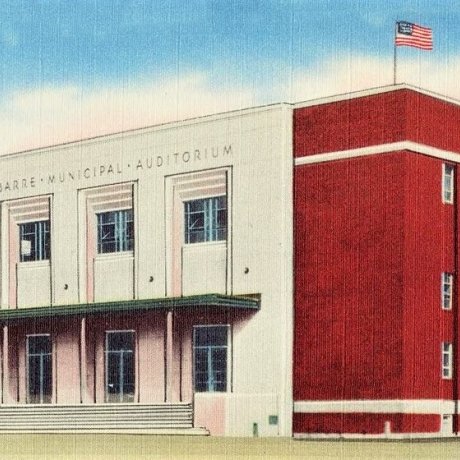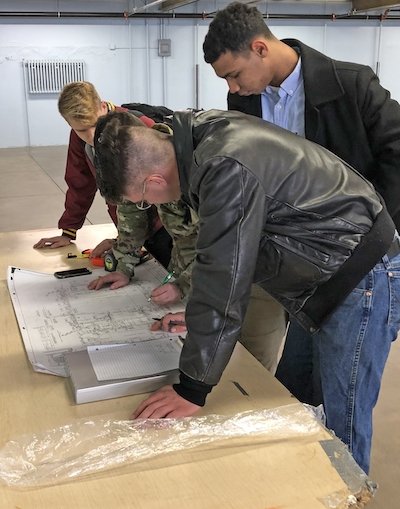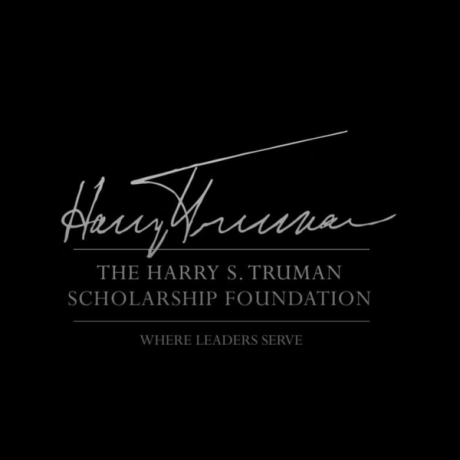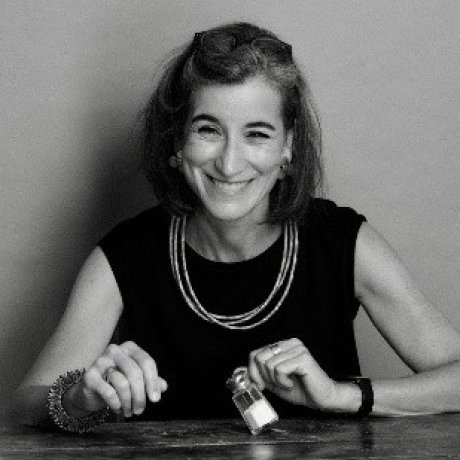The Civic Center Committee Partners with Norwich University, Senator Bernie Sanders to Update the Historic Barre Auditorium
The historic Barre Municipal Auditorium has long been a community hub in the city of Barre. Designed by Ruth Freeman, the first female architect in the state of Vermont, it opened its doors in 1939. It has played a variety of roles since then, hosting trade and farm shows, town fairs, concerts, municipal voting polls and state basketball championships. Lately, though, it has been somewhat of a second classroom for Norwich architecture, engineering, and construction management students.

The building itself has aged, and Sue Higby, vice chair of the Civic Center Committee, which is responsible for the auditorium, decided that Norwich might be of help to improve the building. “I reached out to Dr. Michael Kelley and started a relationship early on in the fall of 2021,” she said. “He was willing to discuss the possibility of focusing the next senior project that he was leading on the Barre Auditorium.”

Since then, the possibility turned into reality. University students led by Tonya Forcier, visiting assistant professor of architecture, and Dr. Mike Kelley, associate professor of civil engineering, took on an interdisciplinary project with the hopes of improving the building and teaching their students along the way. According to Kelley, this is the biggest project they have ever tackled.
The size of this project does not only relate to the amount of work that the students undertook to plan upgrades for the building, but to the impact that this building has on the community. “A lot of people have their experience with the auditorium as a sports venue, which is wonderful and I think that it really engages people, but it also serves as a Red Cross emergency shelter for Washington County and a medical surgical annex to the Central Vermont Medical Center,” said Higby.
Kelley would wind up taking students on multiple trips to the auditorium to do walks through to see the building in use.
“I think it was really smart because he had them fully engaged when they realized how important the Barre Auditorium is to not just Barre City, but the region as a whole,” said Higby.
Ian Mace, a senior engineering student, said that seeing a local hunting group’s banquet helped emphasize the auditorium’s importance.
“They had a banquet, and it was the first they’ve been able to have since COVID. It was huge to see something like 150 tables set up for 400 or 500 people.”
When he reflects on the initial trips, he remembers thinking that “Given some more modern updates for the building, it will help bring in not just more community support, but even more revenue to the city.”
After getting acquainted with the building and its impact on the community, the group was ready to begin their work. They began by putting together a feasibility study, which is not typically part of the educational process. “They went through a full evaluation of what needed to happen at this building that was constructed in 1939 and has had virtually no upgrades,” said Forcier.
Feasibility studies are the first step in a development project and are intended to help real estate developers and investors understand the viability of their goals for a property. The process involves studying targeted objectives that affect development size, cost and usage. These studies can limit risks on projects by verifying that development goals can be met within building and zoning codes.
“It’s basically figuring out does it make sense to renovate or reuse a building in some way,” said Cara Armstrong, director of the School of Architecture + Art. “It’s showing that different goals that can be met, that it’s affordable and that it’s viable.”
The interdisciplinary group worked together for the entire academic year, and Kelley saw how well they worked together. He envisions the relationship between the students as a triangle. “I put the architects up at the top of the triangle, and then on either side on the corners are the engineers and constructors,” he said. “One of the key principles of structure is that triangles are very strong, very cost effective and very simple to construct. Yet, they have a great deal of strength. That’s what I see when all these people come together.”
Thomas Shepard, a senior architecture student acting as project manager, said that his work on the project has provided realistic knowledge and experience outside of just traditional design education. “There is a lot of design work, but its main focus is teaching us how a firm would interact with a client,” he said, highlighting how he has gained experience that can translate to the professional world, where he will have to interact with people of all disciplines.
Eventually, the students completed the feasibility study and developed a construction proposal which they presented to city officials in front of a packed audience. In Armstrong’s opinion, the proposed plan is bursting at the seams with potential upgrades that are full of feasibility.
“One of the cool things from the proposal that the students put together is that they’re proposing that Barre Auditorium could become net zero,” said Armstrong. “Which is our way of saying it wouldn’t need to buy any electricity for the rest of its lifespan.”
This would be accomplished through 250 solar panels on the roof. “Geographically where the building sits, even though Vermont has very little sunshine, there’s nothing that’s going to block whatever sun is available,” said Kelley. “It’s an ideal location to put a solar array.”
With the proposal formally introduced, the City of Barre will be able to move forward as they see fit. “We can’t be the architect or engineer of record on this building,” said Kelley. “The city would have to go out and hire a firm, get a contract to see it through.”
An endeavor of this magnitude is costly. Luckily, Vermont’s Senator Bernie Sanders stepped in. He was able to earmark funds in the 2023 omnibus bill specifically for the Barre Municipal Auditorium at the amount of $3,451,000.
Higby said that when she found out that the paperwork for funding had been shared formally with the senator, she provided additional information about the senior project because she felt that it would strengthen the proposal.
“From hosting epic high school basketball championships and the long-standing Vermont Farm Show to providing emergency shelter, the Aud has stood as an essential pillar of Barre’s community since 1939,” said Senator Sanders. “I was proud to secure this funding for much-needed upgrades and renovations so that Barre families, and Vermonters across the state, can continue to visit and use the Aud for generations to come. I am glad to see Norwich University students join the effort to sustain this historic space and get some good in-the-field experience along the way.”
With the students’ work on their project completed, and federal funding for upgrades secured, Higby is confident that the auditorium is not the only one to get something out of this process. “I really think that these work experiences are exceptionally helpful in positioning students to be leaders in their field,” she said. “I’m really thrilled that I’ve been able to work with senior faculty and students on this project that helps the Barre Auditorium, as well as something that should help them in their careers.”
* * *
Norwich University is a diversified academic institution that educates traditional-age students and adults in a Corps of Cadets and as civilians. Norwich offers a broad selection of traditional and distance-learning programs culminating in baccalaureate and graduate degrees. Norwich University was founded in 1819 by Captain Alden Partridge of the U.S. Army and is the oldest private military college in the United States of America. Norwich is one of our nation's six senior military colleges and the birthplace of the Reserve Officers’ Training Corps (ROTC). www.norwich.edu
Media contact:
Saraa Kami
Director of Communications
SKami@norwich.edu
Marcus Popiolek
VP Marketing and Communications +
AVP Enrollment Services, College of Graduate and Continuing Studies
mpopiole@norwich.edu
Follow us on Twitter @norwichnews
Read More

Norwich University Endorses Duffek, LaCroix, and Walker for the Truman Scholarship
By Thy Yang
Three students earn the University's endorsement in pursuit of the prestigious Truman Scholarship.
7 min read

The School of Architecture + Art continues lecture series with screening of "My Mother, the Architect"
By NU Marketing & Communications Office
Norwich students and the general public are invited to attend the screening of "My Mother, the Architect," which will be followed by a Q&A with the director.
2 min read

NUCE Senior Spotlight: C/CPT Edward Phillips '26
By NU Department of Civil Engineering and Construction Management
Norwich's civil engineering program celebrates one of its many high-achieving students.
2 min read
